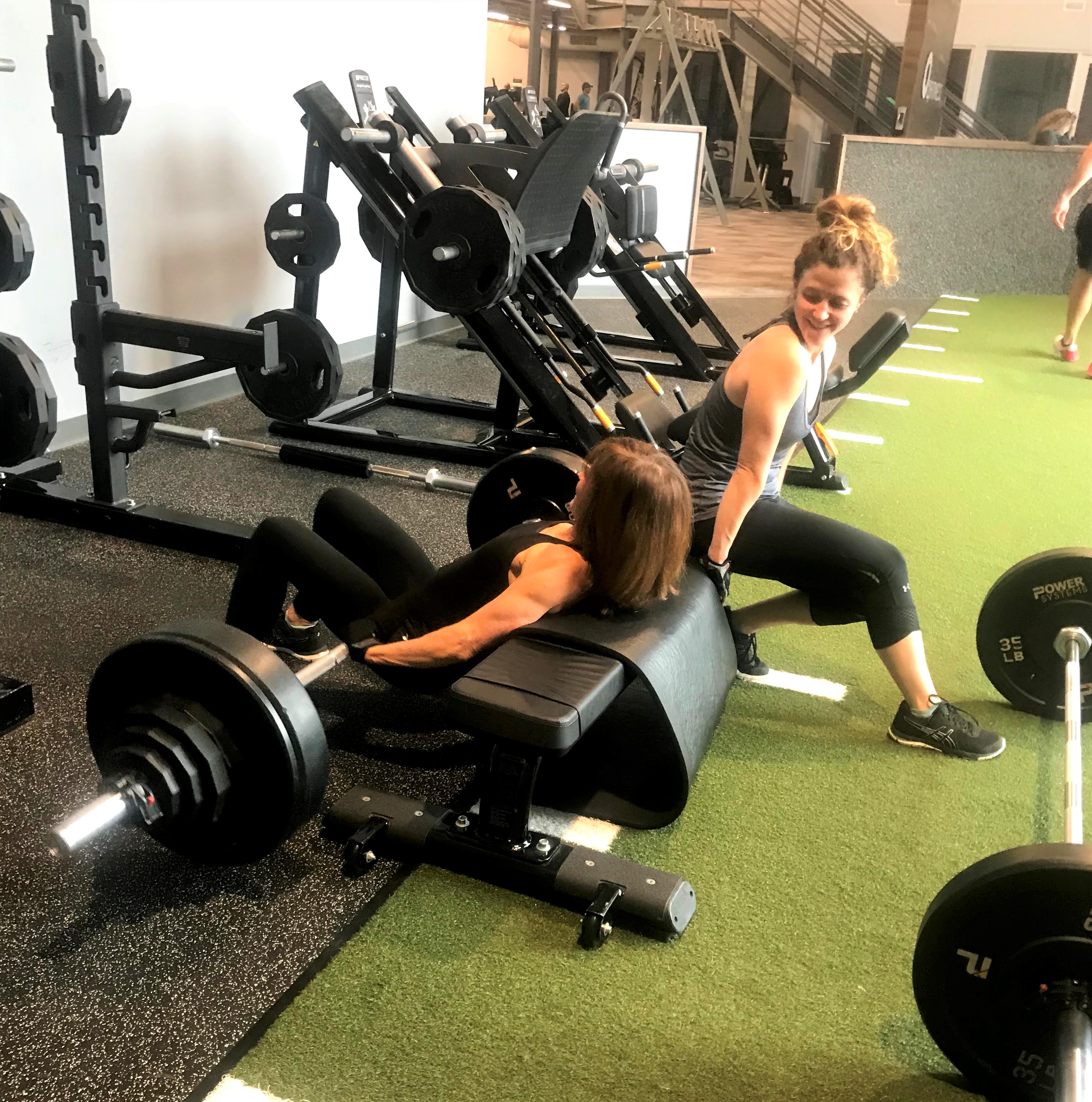Have you been working out and eating less but not seeing any changes in your body or the results you want? Troubleshooting the reasons why your training attempts aren’t working can be difficult to do. Lackluster results is one reason why women jump from one weight loss exercise program to another. Maybe they start with group fitness classes to bootcamps to crossfit to yoga in the hopes that one style of training will “work for their body”.
This article will help solve training mistakes so you can be more efficient with your weight loss exercise program and get results.
#1 Lifting too light and often with inefficient form.
Women are often focused on “toning” because they want to avoid “getting bulky” so they choose weights that are too light and their form tends to be very “compensatory” which then leaves some areas overdeveloped while other areas are underdeveloped and/or injured.
In order for the body to become more metabolically active so it can become more efficient at burning fat your muscles need to be overloaded to stimulate the cells to grow larger. This does not mean that you will “bulk up” but it does help the muscle become more dense and therefore stronger.
Also, workouts need to be metabolically stressful enough so that you raise your metabolic rate during the recovery phase and elevate fat burning hormones. Having inadequate form affects the intensity of workouts which then negatively impacts the ability to raise your metabolic rate enough.
For example, most women have a very weak posterior chain. Their “backsides” (glutes, hamstrings, upper and mid back muscles) are often hibernating. These muscle do not always participate in exercise such as lunges, squats, deadlifts and bentover rows. Instead, their muscles compensate and all they feel is their quads (front of legs), neck muscles and low back. This not only makes training painful but also severely inefficient. Having sub-optimal and unstable form makes it very difficult to lift heavy enough without getting hurt.
Women then put in a lot of time they don’t have with energy levels that are so low into doing training that does not get them results or worse, they get hurt.
Studies show that by training with weights that are 65-80% of max weight you can lift helps you to achieve workouts that have enough metabolic stress and also overload the muscles properly to stimulate new growth. For example, if you can squat one rep with 100 lbs. then you should be using 65lbs. – 80lbs. weights in your squat set of 8-12 reps.
Also, when women lift heavy enough their bodies will recruit more muscle fibers that won’t get recruited otherwise. This mean that your muscles won’t develop into the beautiful curves you hope to see when you lose fat.
Lastly, when you push yourself to go a bit heavier or by adding more reps you’ll get excited each time you reach a new lifting weight you couldn’t do months prior. Getting strong is exciting! It’s way more exciting that spending another hour on the “dreadmill” just putting in time and getting nowhere fast.
MOTHER, 60 yrs. old and DAUGHTER, 30 yrs. old WEIGHTLIFTING!
#2 Your calorie intake is WAY OFF
Most women either significantly under-eat/under-nourish or they overeat. Most women who are looking to change their body composition are not eating optimally. If they were, they wouldn’t be reading articles like this.
Many women tend to cut their intake down to 1400 -1000 calories a day in a frantic attempt just to get the weight off. This causes a cascade of problems. When women restrict their calories too low their bodies sense the lack of “energy intake” and their body is smart. It’s trying to preserve life at all costs so it is going to down-regulate its hormones and activity level to preserve energy. Thyroid hormone decreases, pituitary hormone goes down, testosterone plummets and cortisol skyrockets. Plus, when eating so little the body loses precious lean mass. Lean mass is like a well allocated investment account for retirement – it works FOR YOU and makes money in your sleep. You never want to lose lean mass but women put it at risk all the time by under-eating and doing way too much cardio.
The result is a lowered metabolic rate and this is where many women begin to notice that they gain weight when eating 1500-1600 calories. The weight gain is enough to scare them back into the world of 1000-1400 calories in order to just “not gain” weight.
If this sounds like you then you need to work at slowly increasing your caloric intake while prioritizing protein so you can have the energy needed to train well and with enough intensity so you can increase your metabolic rate over time through activity and through increasing your lean mass. The main goal initially for women who have been restricting food should be to slowly re-feed while lifting weights so they can change their body composition into a machine that works FOR THEM instead of against them.
The other scenario is women who overeat or use food as a tool to deal with emotional stress. Over-eaters tend to under-report caloric intake by at least 500 calories. This means that they may think they are eating 1500 calories a day and staying in a deficit but in reality they are eating close to 2000 calories.
Being accurate with food journaling is a skill. It takes many women weeks of practice before they begin to accurately measure their food. This can be an issue in both cases of either over-eating or under-eating. It is as problematic to under-eat as it is to over-eat.
The reality is humans are not very good at accurately estimating food intake. If they could eyeball food well then again they would not be reading articles like this.
#3 Not pushing themselves enough
There is no great talent in making a client breath heavy and sweat a lot. Doing 15 minutes of burpees will certainly accomplish fatigue and sweat but it would not be a very efficient way of spending 15 minutes of workout time.
We have seen it time and time again. People take a very laid back approach to training. They sit on a machine and do a few reps. Sit back, check their phone, post something on Instagram so their friends and family see them working out. They do a few more sets and then move on to another machine.
Maybe they finish it off with a low intensity run on the treadmill or elliptical.
The fact is if you want to change your body you are going to have to get comfortable with feeling UNCOMFORTABLE. You are going to have feel like you are breathing heavy and your heart rate should be elevated. Maybe you feel like you can push or pull another rep and it’s going to burn and fatigue. You might even feel like you are going to die.
Just know that those last few reps that are the hardest to push through is the time when the most damage is done to the muscle and the most progress can be made. Don’t skimp because your MIND tells you that you are fatigued. Your mind will always give out before your body actually fatigues.
These three factors are needed for your workout to be effective so your body can change.
- Metabolic Stress – you know when your muscles burn and build up lactic acid? Yeah, that unbearable feeling that makes you want to shake your legs out or stretch out your abs because they burn so much. Well, that feeling also contributes to increasing your metabolic rate since the lactic acid build up also tells the brain to release growth hormone and epinephrine. Those key hormones help to increase your metabolic rate so you burn more calories AT REST and it helps increase muscle strength and size.
- Muscle Damage – this occurs when your form is SPOT ON so you can you hit the muscle “just right”. This causes post workout soreness which is not pleasant but it’s also an opportunity for your body to get to work to repair those sore muscles so they can grow and develop shape.
- Mechanical Tension – this occurs when your muscles contract so you can create a lean, toned body.
Ladies, don’t slack in the gym!
Don’t just “put in time”.
Make your time worth it and think that it’s better to really put in 100% effort for 30 minutes than spend 90 minutes lollygagging along.
#4 Doing too much cardio or inefficient cardio
There are a few reasons why it can be a mistake to resort to cardio to lose weight or change your body.
- Women tend to try to burn as many calories as possible. They think they are ahead of the game if they burned 600 calories before they even had breakfast. The result often becomes hunger for which they overcompensate for with food. Another words, they end up eating more than they burned. Also, many women fail to fuel their bodies to train and the body will find the energy needed from proteins in your body – also known as your muscle. Undereating and over-burning calories is not a winning solution.
- The body will adapt to the cardio workouts you perform and it will burn few calories for the same 3 miles you ran. For example, let’s say your run 10 miles every week. In the beginning you may have noticed that it helped you to lose weight. Maybe you burned 90 calories for every 1 mile. Overtime, your body will become more efficient at spending its energy and it will burn 70 calories for every 1 mile. This means it becomes more efficient and adapts to the same amount of cardio. The option is then to run faster or run longer and that can only happen for so long.
- Lastly, aerobic exercise can actually interfere with your muscle gain by slowing recovery and using calories that your body needs for the process of building muscle.
Instead of spending hours on cardio machines aiming to burn 800+ calories try doing NO MORE than 25 minutes of interval based cardio. Even if you are de-conditioned and cardio seems almost impossible there are still interval or sprint based workouts you can do.
BEGINNER EXAMPLE:
Bike Sprints (can use an Airdyne bike which is fan powered or a cycle bike or a recumbent bike)
Perform 20 seconds as fast as you can. Push yourself to a top speed and set resistance so you feel challenged but not so it’s impossible to move. You should feel like you are going up a slight hill.
Once you reach 20 seconds – STOP and rest for anywhere between 20 seconds and 1 minute.
Repeat this for 10 – 15 rounds.
When you get a bit more conditioned you would LIMIT the rest time to a strict 20 seconds, for example. The intervals would then be 20 sec. FAST/20 sec. REST – repeat for 10-15 rounds.
FINAL THOUGHTS
Losing weight and changing your body composition has more to do with skill, strategy, patience, technique and commitment vs. finding the next new fad diet that will give you a “jumpstart” or “quick win” or “easy solution”.
Stop chasing promising fads and learn to develop a system that works for nutrition, training and mindset. It may seem like it will take a long time to see results at first but in reality you will spend FAR LESS time circling the drain and then starting over.

